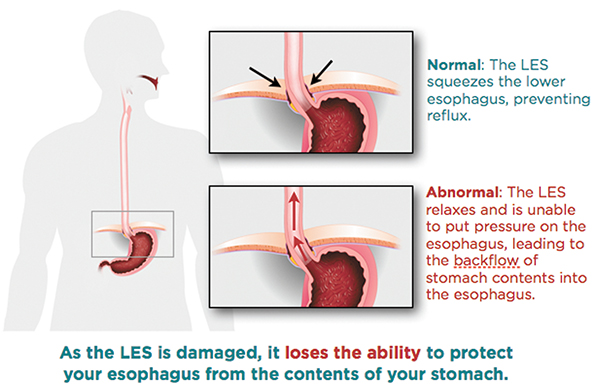By Daniel Lindenberg, MD, PA –
We have all experienced heartburn or acid reflux periodically. When is it time to seek professional help? Acid reflux is a normal physiologic process where the gastric contents of the stomach back up into the esophagus. When heartburn occurs infrequently, less than once a week, a simple over the counter antacid can work well. Antacids typically work within 5 minutes and last for 30 – 60 minutes or longer.
However, if you are experiencing acid reflux symptoms more regularly you could be running the risk of damage to your esophageal lining. We diagnose Acid Reflux Disease (GERD) by two indicators; first, Reflux causing macroscopic damage to the esophagus (called Erosive Esophagitis – EE). This is typically diagnosed during an upper endoscopy also called an EGD. This is a procedure during which a fiber optic camera inserted into the mouth for inspection and sampling of the esophagus. Secondly, Reflux symptoms not causing macroscopic changes but rather those that are simply reducing quality of life (Nonerosive reflux disease – NERD).
Long term untreated Acid reflux or GERD can lead to severe health complications. Repeated gastric juice exposure can erode the lining of the esophagus, larynx, throat, and mouth. This can lead to:
• Ulcers — Ulcers can form in the esophagus as a result of burning from stomach acid. In some cases, bleeding occurs. You may not be aware of bleeding, but it may be detected in a stool sample to test for traces of blood that may not be visible.
• Stricture — Damage from acid can cause the esophagus to scar and narrow, causing a blockage (stricture) that can cause food or pills to get stuck in the esophagus. The narrowing is caused by scar tissue that develops as a result of ulcers that repeatedly damage and then heal in the esophagus.
• Lung and throat problems — some people reflux acid into the throat, causing inflammation of the vocal cords, a sore throat, or a hoarse voice. The acid can be inhaled into the lungs and cause a type of pneumonia (aspiration pneumonia) or asthma symptoms. Though rare, chronic acid reflux into the lungs may eventually cause permanent lung damage, called pulmonary fibrosis.
• Barrett’s esophagus — Barrett’s esophagus occurs when the normal cells that line the lower esophagus (squamous cells) are replaced by a different cell type (intestinal cells). This process usually results from repeated damage to the esophageal lining from chronic acid reflux. The intestinal cells have a small risk of transforming into cancer cells and require periodic surveillance. Barrett’s esophagus is curable without surgery.
The good news is there are effective treatments available to manage these symptoms, cease discomfort, and stop damage to your body. Lifestyle management includes decreasing the consumption of trigger foods (high fat content, spicy, dairy, alcohol & tobacco), weight loss, avoiding large and late meals, tight fitting clothes. It can also be helpful to chew gum or lozenges. If these changes are not effective in controlling your experience of GERD symptoms, a number of medications can control the production of acid that creates the discomfort and damages your body:
• Histamine antagonists H2 Antagonists — the histamine antagonists reduce production of acid in the stomach. However, they are somewhat less effective than proton pump inhibitors. Examples of histamine antagonist include ranitidine (Zantac®), famotidine (Pepcid®), cimetidine (Tagamet®), and nizatidine (Axid®). These medications are usually taken by mouth once or twice per day. Cimetidine, ranitidine, and famotidine are available in prescription and non-prescription strengths.
• Proton pump inhibitors — PPIs – reduce the production of acid in the stomach as well. Examples of PPI’s include omeprazole (Prilosec®), esomeprazole (Nexium®), lansoprazole (Prevacid®), dexlansoprazole (Dexilant™), pantoprazole (Protonix®), and rabeprazole (AcipHex®), which are stronger and more effective than the H2 antagonists.

Common Symptoms of GERD:
• Feeling that food is stuck behind the breastbone
• Heartburn or a burning pain in the chest (under the breastbone)
• Increased by bending, stooping, lying down, or eating
• More likely or worse at night
• Relieved by antacids
• Nausea after eating
Less common symptoms are:
• Bringing food back up (regurgitation)
• Cough or wheezing
• Difficulty swallowing
• Hiccups
• Hoarseness or change in voice
• Sore throat
In using any medication your doctor will work with you to find the right dosage, combination and timing of your medication. The goal of medication in treating GERD is to use the smallest dose that effectively eliminates your symptoms and stops the damage to your body. All medications come with risk factors and potential side effects. In evaluating your specific needs it is important to work with a doctor specializing in the treatment of GERD and its potential complications.
If you are experiencing heartburn more that once per week, you are not currently being treated by a medical professional, or your current course of treatment is not effective in controlling your GERD symptoms, it’s time to seek professional help. There are options available to control your symptoms, suffering and stop the damage acid reflux can create in your body.
Check Also
Trusted Homecare Agency: Serving Veterans with Free Supplemental Home Healthcare
When it comes to healthcare, veterans deserve the best care possible. For veterans seeking in-home …
 South Florida Health and Wellness Magazine Health and Wellness Articles
South Florida Health and Wellness Magazine Health and Wellness Articles




